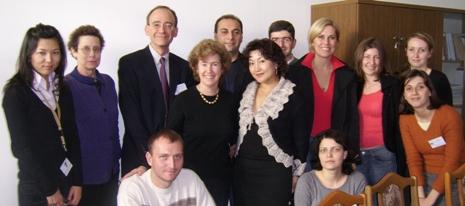Clincal Profs Teach in Bialystok, Poland
Genty, Liebman and Schatz Participate in Clinical Legal Education Colloquium
Bialystok, Poland, October 19-21, 2007
November 5, 2007 (NEW YORK) — Columbia Law School professors Philip Genty, Carol Liebman and Barbara Schatz recently participated in a three-day conference in Poland that looked at ways to improve legal education in Eastern Europe. “The Next Step Forward in the Development of Clinical Legal Education in Poland — Judicial Practices Center and Mediation Clinic,” was sponsored by the Faculty of Law, University of Bialystok.
“In post-communist Europe, clinical education is a very useful way of creating the kind of lawyers who understand the role of lawyer as problem-solver. Changing legal education is an important part of the process of getting people to think about law in a new way, as a tool rather than a system of oppression,” said Professor Schatz.
Professors Carol Liebman (second from left), Philip Genty (next) and Barbara Schatz (next) with participants from Moldova, Kyrgyzstan, Armenia and Georgia.
The three professors led workshops for students and professors from law schools in Poland and five countries of the former Soviet Union. Genty spoke on moot court competition, Liebman on mediation and Schatz on clinics which represent non-profit organizations and small businesses.
Schatz also gave a presentation about clinical education in the US and its implications for countries in the region. “My goal was to encourage law teachers to teachers to pay attention to educational outcomes — to their aspirations for graduates and the curricular changes that would be necessary to achieve them.”
Genty had previously worked with some of the colloquium’s participants from Moldova, Kyrgyzstan, Armenia and Georgia. “They are all relatively new law teachers, and I was happy to have a chance to meet them again and find out about the teaching they had been doing in the months since I last saw them,” Genty said.
He was particularly excited to work jointly with Schatz and Liebman. “Although we had each done a good deal of international work previously, we had never done so in collaboration with each other,” he said. “This was a truly rewarding team teaching experience for me.”
Columbia Law School, founded in 1858, stands at the forefront of legal education and of the law in a global society. Columbia Law School joins traditional strengths in international and comparative law, constitutional law, administrative law, business law and human rights law with pioneering work in the areas of intellectual property, digital technology, sexuality and gender, and criminal law.
